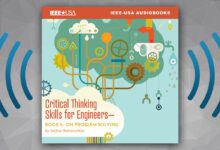
In IEEE-USA’s October free e-book for members only, Developing Your People–Commonsense Leadership in the Workplace–Vol.3: Career Asset Management, Teamwork, Empowerment, author Harry Roman completes this e-book trilogy.
Volume 3 explores how managers and leaders can put the right people in the right places within an organization, achieve a team-based approach to problem-solving, and empower employees to meet the future challenges of their jobs.
Roman’s book offers readers excerpts from the IEEE’s Career Asset Management (CAM) tool he helped to develop. CAM is a seven-step process for disciplining users to ask the right questions, to develop plans for where they want their careers to go, and how to map out a strategy for getting there.
He also discusses how managers can put together successful teams–by balancing team members’ professional development. He advises letting them take time for formal professional courses and activities–both in the skills they will need on the team, and in the areas that keep them current in the field they came from.
Exploring employee teams, Roman warns that they “sometimes tend to average down high-achievers, restraining their immense energy and tremendous momentum.” He notes that the can-do spirit of high-performers often reenergizes evolving companies. Roman recommends putting these “race horses” in charge of the teams, and letting them set a fast pace.
The author also discusses the team’s composition and assignment within companies. He points out that teams can involve dedicated assignments of individuals for set periods. Or be part of a matrix assignment, along with an individual’s other regular functions. From his own experience, Roman prefers the matrix style of assignment. He says it tends to give workers some variety, often allowing them to intellectually shift gears between subject matter. Teams that have tedious assignments–with the same old faces, day in and day out, can quickly become stale–if their team leaders do not maintain proper working environments. Burnout can occur, and both the teams and individuals suffer greatly, even to the extent of damaging future working relationships between team members.
“Professionals want to be involved in a learning environment, Roman writes. “They expect mentoring, with the opportunity to grow in new directions.” Further, he denotes that working on a team can give employees the uneasy sense they are confined to only one backyard, when they have an irresistible urge to roam around and cross-pollinate–something you really want in a dynamic and challenging market. Roman explains that when putting together a team, “the hybrid ideas are generally the strongest and the best.”
Finally, on the topic of teams, Roman advises if you cannot plan for the time your team needs to prepare for the solution, then don’t assemble a team at all. He says it won’t succeed. “Team members must have the freedom to tell their managers and leaders what is not possible,” says Roman. “Moreover, you, as their leader, must have the maturity and wisdom to listen to them; and if necessary, tell your boss when something cannot be done.”
Roman concludes the astute leader knows the real risk of assembling teams: it means having the courage to give up some authority, and listen to what your experts are telling you.
In October, IEEE-USA is offering this award-winning $7.99 e-book, free to IEEE members only!
From 1 October through 15 November, IEEE members can get their free download by going to: https://ieeeusa.org/shop/careers/developing-your-people-commonsense-leadership-in-the-workplace-vol-3/
Log in with your IEEE Web account, add the book to your cart, and use promo code, OCTFREE17, at checkout.
Georgia C. Stelluto is IEEE-USA’s Publishing Manager, Manager and Editor for IEEE-USA E-BOOKS, and Department Editor for InFocus in IEEE-USA InSight.






